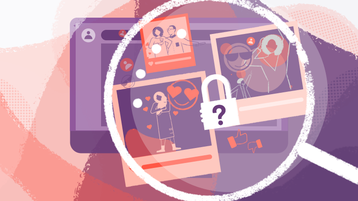HR Headaches: Should You Be Monitoring Employees’ Social Media?

Table of contents
- 1.Is monitoring employees' social media legal?
- 2.Is monitoring employees' social media profiles ethical?
- 3.Employers are checking
- 4.Be careful how you react
- 5.Give fair warning when checking employees' social media
- 6.Outsource the monitoring
Almost everyone today has a real-life and one that's online. As a result, our social media relationships and interests may be as important to us as our personal connections. As social media use has risen, so has the possibility employees might be posting images or content that's contrary to a company's mission and values. For many organizations, monitoring employee social media is necessary for doing business in today's public-scrutiny environment. When employers wonder whether they should be monitoring employees' social media accounts, there are several issues at play. First, whether or not it's legal; next whether or not it's ethical; and finally, how, if you decide to monitor, you should do it. Some guidance on these considerations may help you determine whether social media monitoring is right for your company.
Is monitoring employees' social media legal?
Adding your employees as friends on social media can blur the line between friend and employee.
There are no laws prohibiting employers from viewing public social media posts. Some workers' posts are restricted to friends or connections only. When they post without restrictions, making their content public, employers have the right to view the post, just as anyone would. In most states, that's the extent of an employer's rights. In almost half the states, laws have been enacted to limit access to employees' social media. These have passed laws that prohibit employers from asking:
- For employee login information (including screen names)
- To change their privacy settings to allow employers access
- To connect or 'friend' the employer as a business or individual
These states have separated employee personal business from their professional lives. While only about half of our states have active laws, legislation may be pending in your area. Even if there isn't a law barring it, a best business practice prohibits managers from requesting employees make them a connection or friend on social media. Blurring the line between employee and friend can make it difficult to maintain a professional relationship — it's best to keep the two worlds separate.
Is monitoring employees' social media profiles ethical?
The question next becomes whether or not it's ethical to view employee pages, Facebook, Instagram, SnapChat or TikTok, etc., for personal posts, or professional, like LinkedIn or specialty sites. Most businesses agree if the posts are not restricted, and are available to everyone, that includes the company the employee works for. Employers do take a risk when they monitor employees' social media accounts: they may run across information they shouldn't or wouldn't want to see. For example, you may find posts about illnesses the employee hasn't disclosed for themselves or family members. You may see pictures of employees who party hard. These may color your judgment about the employee. Unfortunately, some users aren't responsible or tech-savvy enough to separate posts for public or private viewing. So there's always the chance you'll view something you wish you could un-see.
Employers are checking
If you decide you should check, you're not alone. Most employers are checking social media. The Manifest company found 90% of employers check the social media accounts of potential hires, with 79% admitting they eliminated a candidate based on what they viewed. In some cases, job seekers erase their online presence before they apply — that's risky too. A CareerBuilder survey found that 57% of employers are less likely to interview candidates if they can't find them online.
57% of employers are less likely to interview candidates when they can't find their social media profiles or other information online.
Many companies go further, continuously monitoring employees' online accounts to look for red flags. They may be justified. We've all seen the negative impact an employee's social media post can be on business. One damaging post, even a picture, can quickly go viral and end up costing the company customer goodwill or worse. The risk/benefit ratio for most businesses is to err on the side of company protection and monitor.
Be careful how you react
Take care in your reaction to personal information and even information about the company you find online if you decide to check social media accounts. If an employee posts about feeling depressed, don't approach them to discuss wellness options. Unless they have discussed it with you personally, your sympathy may be unwelcome and unprofessional. If employees are complaining about work, remember there are laws that may protect them when they make public statements detrimental to your business. The National Labor Relations Board has made it clear when employees discuss working conditions online with one or more coworkers — even negatively — this is protected speech. These 'concerted communications' are protected under NLRB law. If you see these posts, you may wish to discuss the problem the employee is posting online. But businesses are prohibited from retaliating against the employee(s) in any way, including discipline or termination because of the post.
Give fair warning when checking employees' social media
If you don't already have a social media policy, you should. The risk online posts pose to business is great. Assuring only authorized employees post or comment on the organization's behalf is just the beginning. Your policy should prohibit sharing company information as well as protecting your brand. For the employee, businesses should provide fair warning to staff members that the company may view public posts and possibly even monitor them regularly. Let employees know which sites you'll be frequenting — you may even want to give them a lead time to clean up anything that might be NSFW (not safe for work). Encourage employees (you may even want to show them how) to make posts personal, restrict access, or mark for 'friends only' if they include information they don't want the company to see. There may be a few false starts, but they'll soon get into the habit of separating their posts by audience. Emphasize you're not interested in personal information, but your responsibility to protect your employees and business requires due diligence, including social media monitoring. Let employees know you're screening for activity that is illegal, like cyber-stalking, harassment, or discrimination, not their personal information, likes or dislikes.
Let your employees know you're only monitoring their social media accounts for illegal activity, harassment, or discrimination.
Don't ask or encourage employees to promote the company on their personal sites. If their profile picture includes branded company logos, ask they replace it with something more generic.
Outsource the monitoring
Some employers know how important it is to screen, but are hesitant. They're more worried about the things they can't unsee than the risk online posts pose to their business. There are solutions. Some use third-party providers that leverage technology and AI to monitor employees' social media platforms continuously. These look for specific language and terminology that may be a red flag, ignoring all other content. These services can be helpful in monitoring when employee online behavior is out-of-bounds without having to physically look through every post every day. Technology weeds out the wheat from the chaff. Some even allow businesses to tailor what keywords to look for specific to their business, like proprietary information that they shouldn't disseminate publicly. We've seen the fallout of careless online posts in almost every walk of life. Workers posting disgusting (hopefully fake) pictures of filthy restaurants; teachers fired for mocking parents online. Some view it as accountability, others cancel culture, but the threat to business is real. Companies often scramble to distance themselves from the employee. They have to work hard to restore brand integrity and reputation. For many business leaders, checking on employees' social media posts is a small price to pay to avoid the devastation negative or controversial posts might create.
This article is for informational purposes only, is not legal, tax or accounting advice, and is not an offer to sell, buy or procure insurance. It may contain links to third-party sites or information for reference only. Inclusion does not imply TriNet’s endorsement of or responsibility for third-party content.

Riia O'Donnell
Table of contents
- 1.Is monitoring employees' social media legal?
- 2.Is monitoring employees' social media profiles ethical?
- 3.Employers are checking
- 4.Be careful how you react
- 5.Give fair warning when checking employees' social media
- 6.Outsource the monitoring






